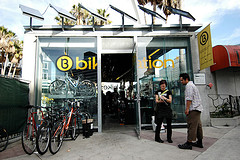A reader sent over a story from Marketwire that I thought was a very good sign for biking in America.
Tech Coast Angels (TCA), “the largest angel investor group in the United States”, has decided to invest $500,000 in Bikestation. Bikestation — which is now a registered trademark of Mobis Transportation Alternatives, Inc. — plans, designs, and operates “bike transit centers”. The facilities provide secure parking and other amenities to urban bike commuters (I visited a Bikestation in Long Beach back in 2007).
In a statement about the investment, a spokesperson for TCA had some very encouraging words about Bikestation:
“This company is so hot and their solution is so vital to the new green economy, they just couldn’t answer demand for Bikestations fast enough without investors.”
The TCA spokesperson also said that Bikestation is profitable and that they’ve raised their revenue forecasts for 2009, “since they’d already met 70 percent of their annual goal in the first quarter.”
About the services Bikestation provides, TCA said, “It changes people’s minds about what is possible and practical. It is a true paradigm shift.” The company called it “a triple bottom line investment benefiting people, producing profit and saving the planet.”
“This is a massive and unprecedented win for bicycling.”
— Andrea White-Kjoss, CEO of Bikestation/Mobis Transportation Alternatives
I ran into the CEO of Bikestation/Mobis, Andrea White-Kjoss (formerly Andrea White, whom you might recall from a story I did in 2007), at the recent National Bike Summit. She said she had some big developments to tell me about. Unfortunately I was never able to track her down, but I did get in touch with her via email yesterday.
White-Kjoss characterized this investment as nothing short of “a massive and unprecedented win for bicycling”. Not only has an investment like this never been made for a bike commuter facility White-Kjoss said, but the fact that Mobis was able to close a round of funding in this bleak economic climate, “says a lot about what investors are looking for these days.”
With the $500,000, White-Kjoss plans to roll out new projects and improve their existing services. She also pointed out that the nonprofit Bikestation (which owns 10% of Mobis) will use part of the funds to become a grant-maker and continue its bicycling education programs.
This news shows that the private sector is willing to bet that bikes will play a much larger role in America’s future. Hopefully, cities, states, and the federal government will make a similar bet.
(Portland has flirted with a Bikestation in the past on more than one occasion, but so far nothing has materialized.)




